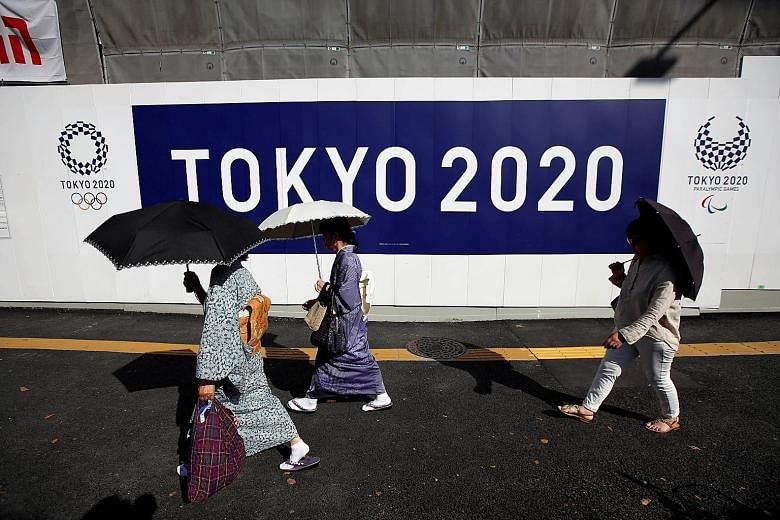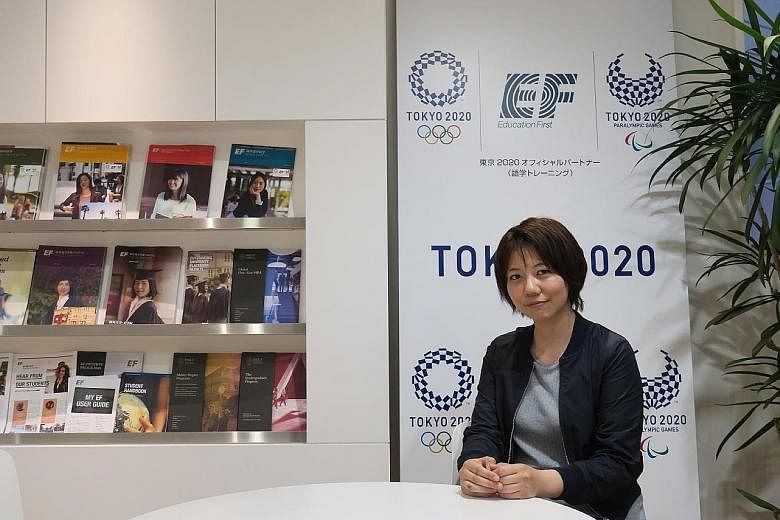Here's a little-known fact: The ubiquitous male and female stick figures on toilet signs today are a legacy of the 1964 Tokyo Olympic Games.
That was also the first Games to use pictograms to indicate sporting events as organisers realised that the use of symbols was the best way to bridge the language divide.
Also having their roots in the 1964 Games are the green emergency exit signs which show the silhouette of a man running out of a door, and the smoking area signs which depict a cigarette with rising smoke.
Signs and symbols that can be easily understood regardless of race, language or nationality are on the minds of the Japanese as Tokyo gears up to host the Olympic and Paralympic Games in 2020.
On the cards are not only plans to revise symbols on signs, but also efforts to teach volunteers conversational English in time for the marquee sporting event.
Japan, notorious for its insular mindset, has set its sights on attracting more visitors in recent years, and logged a record 24 million tourist arrivals last year. It is hoping to rewrite that record and welcome at least 40 million visitors by 2020.
The 1964 Games had spurred Japan out of its post-war slump. Expectations are rife that the upcoming Games will work its magic once more and give Japan's economy a fillip: Economists predict that the Games can add as much as 32.3 trillion yen (S$400 billion) in revenue.
-
IN THE WORKS
-

PUBLIC SYMBOLSJapan is reviewing about 90 public symbols, including the one for onsen (hot springs), to bring them in line with international standards by the time the country hosts the Olympic Games in 2020. But amid protests from traditionalists, the government has said that both the Japanese version (left) and the international one (right) will be used.
BILINGUAL ROAD SIGNS
Some 1.7 million "stop" signs and 1,000 "slow down" signs will have English translations.

IMPROVING ENGLISHLanguage school EF Education First, an official partner for the upcoming Games, is holding conversational English courses for Games Organising Committee members and will also conduct virtual seminars for Games volunteers.
PHOTO: EF EDUCATION FIRST JAPAN
Mr Toru Shida, a representative of the Tokyo 2020 Olympic and Paralympic Games Preparation Bureau, told The Straits Times that the city hopes the Games will have the effect of "catalysing Tokyo's transformation into a sustainable global city, as well as enrich residents' lives".
The bureau hopes to involve as many people as possible. On Monday, it announced an Olympic mascot design contest open to all residents in Japan, be they local or foreign. And in what will be a first in the history of the Games, elementary schoolchildren from across the country will have a say in deciding the winning mascot.
And in another first, 5,000 gold, silver and bronze medals to be used at the Games will be entirely made from recycled metals. Tokyo is now seeking donations of old devices such as smartphones and cameras.
Mr Shida said: "Through the use of both infrastructure 'hardware' and hospitality 'software', we want to take this chance to revitalise the Japanese economy, instil a sense of unity among citizens and promote Brand Tokyo to the world."
WELCOMING FOREIGNERS
Japan, which adopts its own standards for symbols, is now reviewing about 90 public symbols used on signs to bring them in line with global guidelines by 2020, the Ministry of Economy, Trade and Industry has said.
Nearly all the symbols have passed muster, barring one that has got some people hot and bothered.
Denoted by three wavy lines of steam rising from a pool, the onsen, or hot springs, symbol has been the subject of much heated debate.
Some say the symbol, widely used on maps and street signs, may mislead tourists into thinking that the site serves hot food or coffee instead. The international symbol for hot springs includes the silhouettes of three people in a bath.
But some traditionalists insist that the symbol has long been synonymous with Japanese onsens.
Mr Seiji Hori, executive director of an association of ryokan owners in Beppu on the southern island of Kyushu, told the Nikkei Asian Review: "It is like asking us to stop slurping our noodles in Japan. When in Rome, do as the Romans do."
The Japanese government has since compromised and will use both symbols in tandem.
Meanwhile, the traffic police will roll out bilingual road signs by 2020, with some 1.7 million "stop" signs and 1,000 "slow down" signs across the country to be replaced with those that include English translations.
IMPROVING ENGLISH STANDARDS
Beyond signs and symbols, Tokyo also hopes to pull up the country's English standards, which are notoriously poor despite years of compulsory education in the language.
Japan ranked 39th out of 46 countries in mean scores for the Test of English for International Communication in 2015, and last year dropped from the "moderate proficiency" band into the "low proficiency" band on a separate English proficiency index by language school EF Education First.
The school, which has been engaged as an official partner for the upcoming Games, is holding conversational English courses for members of the Games Organising Committee. It will also conduct virtual seminars for Games volunteers, who are required to undergo a language aptitude test.
EF Japan president Sange Lee attributed the worsening English standards in Japan to years of rote- learning of grammar and vocabulary in schools, compounded by few opportunities to speak English on a daily basis. Then there is the primal fear among some Japanese that they might inadvertently say something wrong that will cause them to lose face, he added.
As such, the school hopes to instil more confidence by coming up with programmes to encourage students to speak up, including having them serve as mock tour guides.
It has also been holding conversational English classes for the ice hockey team taking part in the 2018 Winter Games in Pyeongchang, South Korea, as well as Japan's gymnastics team. It is partnering junior high schools with after-school English programmes.
Mr Lee said he was hopeful that budding interest in English can help the country become less insular and encourage creativity and entrepreneurship.
And with more foreigners living in and travelling to Japan come a greater need for English speakers in sectors such as retail, hospitality and medicine as well. To cater to this need, seven universities - in Tokyo, Osaka, Kyoto, Kobe, Chiba, Nagoya and Nagasaki - have teamed up to run biannual English programmes to prepare students for the Olympic Games and beyond.
A BBC report earlier this year had, without citing any schools, also said some language schools in Fukuoka are using British sitcom Fawlty Towers, a 1970s cult classic set in a fictional hotel, for their lessons.
The Tokyo Metropolitan Government has also announced that it will launch a language school in September next year for fifth graders and high school students.
Known as the Tokyo Global Gateway, it will hold practical conversation classes in situations such as shopping and giving directions.
SERVING GUESTS WHOLEHEARTEDLY
As of March, some 14,000 people have attended a course on omotenashi - the Japanese brand of hospitality that, literally translated, means "entertain guests wholeheartedly" - which has been run by the Tokyo Metropolitan Government since 2015 and includes tips on how to approach and help foreigners in English.
Mr Shida said the city intends to recruit at least 90,000 volunteers to serve in such roles as tour guides and interpreters during the Games, in a drive slated to begin in summer next year. The city will also give subsidies to companies that urge their employees to sign up.
But even before the recruitment drive begins, many Tokyoites are already taking steps to improve their English in the hopes of being able to contribute as volunteers.
One of them is Ms Mariko Tomi, 28, whose determination to learn English took her to Singapore for two months last year as part of an overseas immersion programme with EF. Her interest in sports arose from being a former equestrian rider, she said, and she wanted to gain the confidence to speak English to foreigners in time for the Games.
"If I can speak English well, I will be able to communicate with various people and not just the Japanese," she said in halting English.
"In the past, I couldn't properly put into words what I had wanted to say," she said, adding that she can now speak English to customers at the fugu (puffer fish) restaurant in Shinjuku, where she works part time.
Mr Shinzen Endo, 21, a third-year economics undergraduate at the University of Tokyo, said he wanted to improve his English after meeting foreign exchange students.
He said the homogeneity of Japan was one reason why he and his peers had not felt the need to improve their conversational English.
"Of late, there has been more talk about Japan's place in the world and what it means to be 'global'," he said. "And to this end, the Olympics can be a turning point for Japan."


